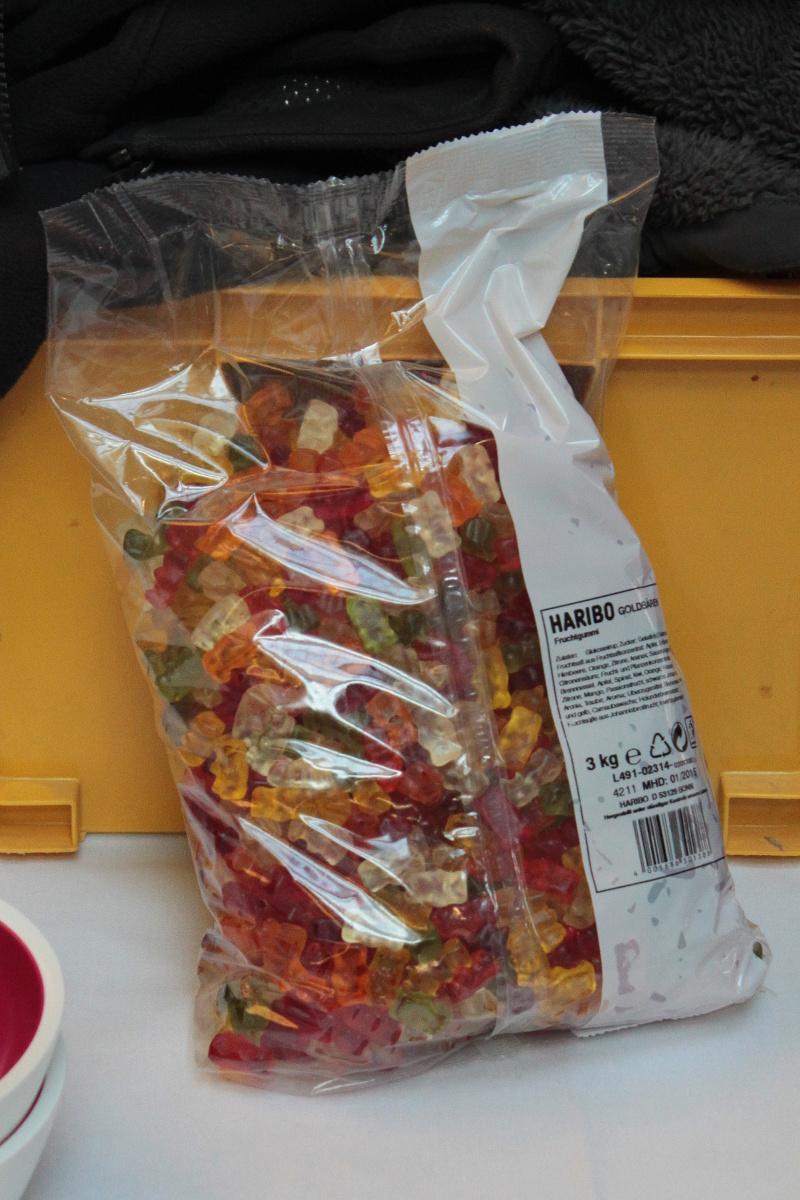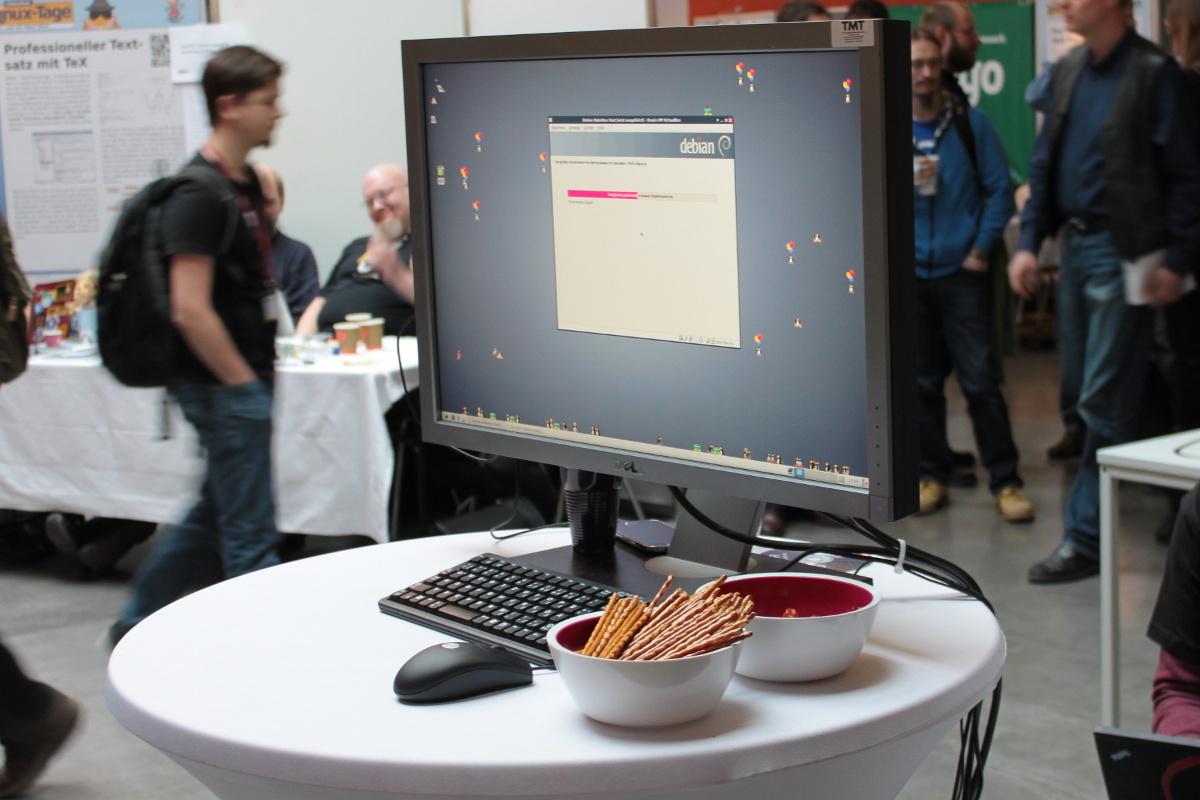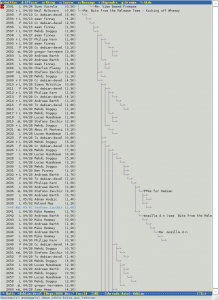

Even though Enrico is not smiling on this picture, he s one of the friendliest Debian person that I know. I always enjoy his presentations because he can t refrain from inserting jokes or other funny tricks.

That said he s serious too, there s lots of good stuff that he has developed over the years (starting with Debtags) and he has put a lot of effort in reforming the New Maintainer process. Read on to learn more about his various projects.
Raphael: Who are you?
Enrico: Hi, I m Enrico Zini, a
DD from Italy. I m 35 and I work as a freelance Free Software developer. One of my historical roles in Debian is taking care of Debtags, but that is not all I do: my paid work led me to write and maintain some weather forecast related software in Debian, and recently I gained a Front Desk hat, and then a
DAM hat.
Raphael: How did you start contributing to Debian?
Enrico: It was 2001, I was at uni, I was using Debian. At some point I wanted to
learn packaging so I read through the whole Policy from top to bottom.
Then I thought: why package only for myself? . There were many DDs at
my uni, and it only seemed natural to me to join Debian as well.
Evidently this was also natural for Zack [Note from editor: Stefano Zacchiroli], who had become DD 6 months
earlier and didn t hesitate to advocate me.
I found the Policy and the Developer s Reference to be very interesting
things to read, and I welcomed my
AM s questions as an excuse to learn
more. I completely understand those people who have fun trying to answer
all the questions in the NM templates while they wait for an AM.
With my super DAM powers I can see that my AM report was submitted on
October 16, 2001 by my AM Martin Michlmayr, and that James Troup created
my account 9 days later, on October 25.
Raphael: You have a special interest in the New Maintainer (NM) Process
since you are a Debian Account Manager (DAM) and a member of the NM Frontdesk.
Thanks to your work the process is much less academic/bureaucratic than it
used to be. Can you remember us the main changes?
Enrico: One of the first things I noticed when I become a Front Desk member is
that there was a tendency to advocate people too early, thinking by
the time they ll get an AM, they ll know enough .
Unfortunately, this didn t always work, and once the real NM process
started it would turn into a very long and demotivating experience both
for the applicant and for the AM. So we tried
raising the bar on
advocacies, and that seems to have helped a lot. If people join NM
when they are ready, it means that NM is quick and painless both for
them and their AMs, who are therefore able to process more applicants.
We also did a rather
radical cleanup of the NM templates , which are
a repository of questions that Application Managers can ask to their
applicants. We realized that AMs were just sending the whole templates
to their applicants, so we moved all non-essential questions to separate
files, to drastically reduce the amounts of questions that are asked by
default.
Other improvements in the NM process came from other parts of Debian:
nowadays there are lots of ways to learn and gradually gain experience
and reputation inside the project before joining NM, which means that we
get many candidates who we can process quickly.
For example, packages can now be uploaded via sponsors, and the
Mentors
project helps new contributors to find sponsors and get their first
packages reviewed.
Then one can now become
Debian Maintainer and take full
responsibility of their own packages, gaining experience and reputation.
The idea of working in teams also helped: big teams like the
Perl,
Python,
KDE,
Ocaml,
Haskell teams (and many more)
are excellent entry points for people who have something to package.
But Debian is
not just for packagers, and one could join teams
like the
Website team, the
Press and Publicity team, the
Events
and Merchandise team or their local
translation team.
Becoming DDs the non-uploading way is not just for non-technical people:
one could enjoy programming but not packaging. An interesting way to get
involved in that way is to help writing or maintaining some of the
many
Debian services. Note that I m not suggesting this as a way to learn
how to program, but as a way to get involved in Debian by writing code.
Finally, we started to appreciate the importance of having people
activities in Debian explicitly visible, which means that the more
obviously good work one has done in Debian, the less questions we need
to ask. Jan Dittberner s
DDPortfolio is an excellent resource for AMs
and Front Desk, and I m maintaining a service called
minechangelogs
that for people who have done lots of work in Debian is able to
fully replace the Tasks&Skills parts of the NM process.
Raphael: What are your plans for Debian Wheezy?
Enrico: For Wheezy I hope to be able to streamline and simplify Debtags a bit
more. At Debconf11 I had a conversation with FTP-masters on how to make
some tags more official, and I now have to work a bit more on that.
I d also like to considerably downsize the codebase behind the debtags
package, now that its job is quite clear and I don t need to experiment
with fancy features the way I did in the past.
I have to say that I enjoy programming more than I enjoy packaging, so
most of my plans in Debian are not tied to releases. For example, I d
like to finish and deploy the
new NM website codebase soon: it would
mean to have a codebase that s much easier to maintain, and in which
it s much easier to implement new features.
I d also like to design a way to allow maintainers to review the tag
submission to their own packages instead of having to wait for me or
David Paleino to do a regular review of all the submissions.
Finally, I d like to
promote the
usage of apt-xapian-index
in more cutting-edge packaging applications. And to design a way to
maintain up to date popcon information in one s local index. And improve
and promote
those services that I maintain, and I tend to often have
ideas for new ones.
Raphael: If you could spend all your time on Debian, what would you work on?
Enrico: If I could spend all my time on Debian, I would do a lot of software
development: I love doing software development, but most of my
development energy is spent on my paid work.
I guess I would start my all your time in Debian by taking better care
of the things that I m already doing, and by promoting them better so
that I wouldn t end up being the only person maintaining them.
After that, however, I reckon that I do have a tendency of noticing new,
interesting problems in need(?) of a solution, and I guess I would end
up wildly experimenting new ideas in Debian much like a victorian mad
scientist. Which reminds me that I most definitely need minions! Where
can I find minions?
Raphael: You re the author of the
Debian Community Guidelines. I have always felt that this document
should be more broadly advertised. For example by integrating it in the
Developer s Reference. What do you think?
Enrico: The DCG was really a collection of tips to improve one s online
communication, based on ideas and feedback that I collected from
pestering many experienced and well-respected people for some time.
Like every repository of common sense, I think it should be widely
promoted but never ever turned into law.
It wouldn t be a bad idea to mention it in the Developer s Reference, or
to package it as a separate file in the developers-reference package.
The reasons I haven t actively been pushing for that to happen are two:
there isn t much in the DCG that is specific to Debian, and I don t have
the resources to do a proper job maintaining it.
It d be great if somebody could take over its maintenance and make it
become some proper, widespread, easy-to-quote online reference document,
like one of those HOWTOs that all serious people have read at some point
in their lives.
Raphael: What s the biggest problem of Debian?
Enrico: It s sometimes hard to get feedback or help if you work on something
unusual. That is partly to be expected, and partly probably due to me
not having yet learnt how to get people involved in what I do.
Raphael: What motivates you to continue to contribute year after year?
Enrico: Debian keeps evolving, so there is always something to learn. And Debian
is real, so everything I do is constantly measured against reality. What
more intellectual stimulation could one possibly want?
Raphael: Is there someone in Debian that you admire for their contributions?
Enrico: I don t think I could reasonably list everyone I admire in Debian:
pretty much in every corner of the project there is someone, sometimes
not very well known, who is putting a lot of Quality in what they do.
Someone who decided that X should work well in Debian or that Debian
should work well for Y or that Z is something Debian people can rely
on and makes sure that it is so.
Those are the people who make sure Debian is and will be not just a
hobby, but a base upon which I can rely for my personal and working
life.
Thank you to Enrico for the time spent answering my questions. I hope you enjoyed reading his answers as I did.
Subscribe to my newsletter to get my monthly summary of the Debian/Ubuntu news and to not miss further interviews. You can also follow along on Identi.ca, Twitter and Facebook.
5 comments Liked this article? Click here. My blog is Flattr-enabled.
 What happened in the reproducible
builds effort this week:
What happened in the reproducible
builds effort this week:




 Also this year the
Also this year the ![[Flashmob @espitas]](http://farm9.staticflickr.com/8530/8571705192_773de2846f_z.jpg)
![[Anti-Flashmod @mensa]](http://farm9.staticflickr.com/8375/8570610397_50e93c0919_c.jpg) On the next two days at the booth we chatted and discussed with visitors and other exhibitors a wide variety of questions, including 'When will be (the next Debian version) released?' and 'Are there installation disks available?'. The answers was as always 'When we are ready and we will have reached the quality-level we defined', 'No we don't have installation medias, as they are always outdated. Do you have an USB-dongle with you?'.
Merchandising was requested by visitors as always, but we just had some leftovers of fosdem, brought by Axel.
On the next two days at the booth we chatted and discussed with visitors and other exhibitors a wide variety of questions, including 'When will be (the next Debian version) released?' and 'Are there installation disks available?'. The answers was as always 'When we are ready and we will have reached the quality-level we defined', 'No we don't have installation medias, as they are always outdated. Do you have an USB-dongle with you?'.
Merchandising was requested by visitors as always, but we just had some leftovers of fosdem, brought by Axel.
![[Most wanted register]](http://farm9.staticflickr.com/8243/8571662996_d5a31a53a1_b.jpg)
![[Jonas flashed us several times with his pocket nuclear reactor]](http://farm9.staticflickr.com/8247/8571662722_99f026108f_b.jpg)
![[Preparing for Eastern]](http://farm9.staticflickr.com/8102/8571662868_75380db929_b.jpg) Many thanks to Florian Baumann, Jan Dittberner, Andreas Tille, Christian Hoffmann, Axel Beckert, Markus Rekkenbeil, Daniel Schier, Jonas Genannt, Jan H rsch and kurio for taking care and running the booth, which worked out this year extreme smoothly from my point of view. Likewise as the last years a special thanks to
Many thanks to Florian Baumann, Jan Dittberner, Andreas Tille, Christian Hoffmann, Axel Beckert, Markus Rekkenbeil, Daniel Schier, Jonas Genannt, Jan H rsch and kurio for taking care and running the booth, which worked out this year extreme smoothly from my point of view. Likewise as the last years a special thanks to 



 Even though Enrico is not smiling on this picture, he s one of the friendliest Debian person that I know. I always enjoy his presentations because he can t refrain from inserting jokes or other funny tricks.
Even though Enrico is not smiling on this picture, he s one of the friendliest Debian person that I know. I always enjoy his presentations because he can t refrain from inserting jokes or other funny tricks.  GNOME 3 packaging
Right after the GNOME 3 release, I was eager to try it out so I
GNOME 3 packaging
Right after the GNOME 3 release, I was eager to try it out so I 